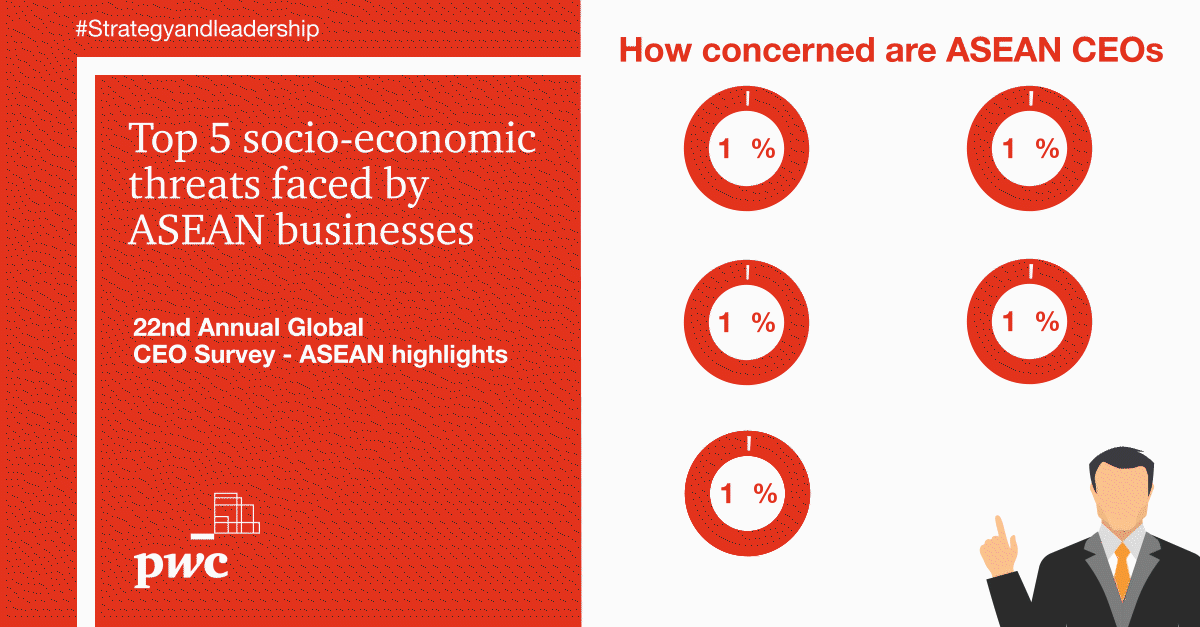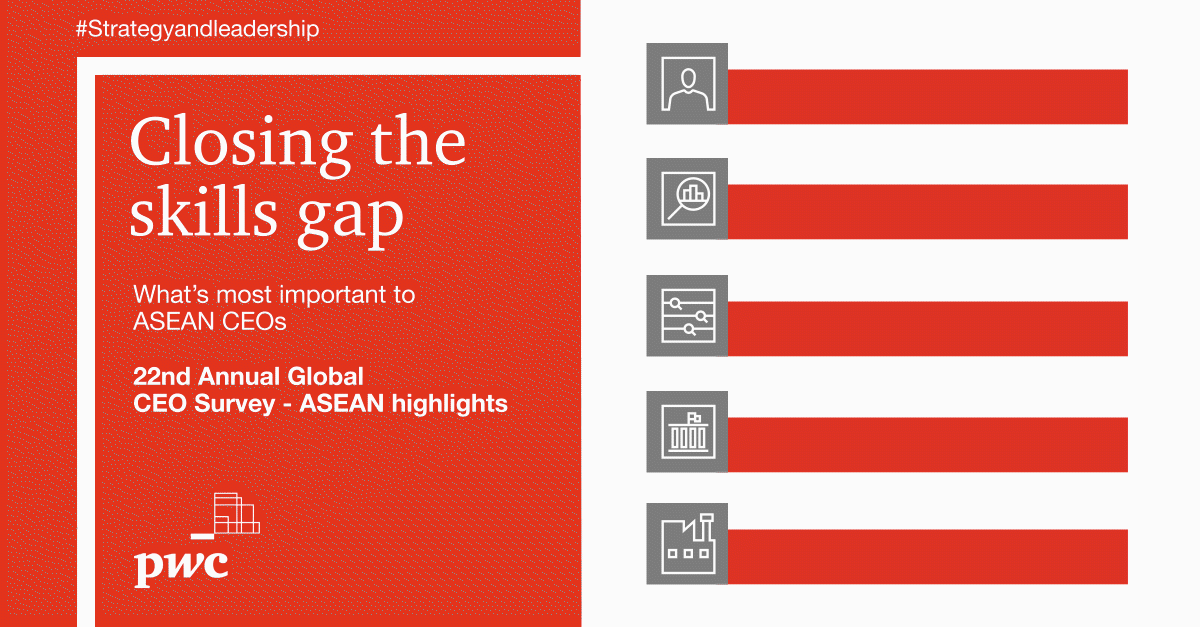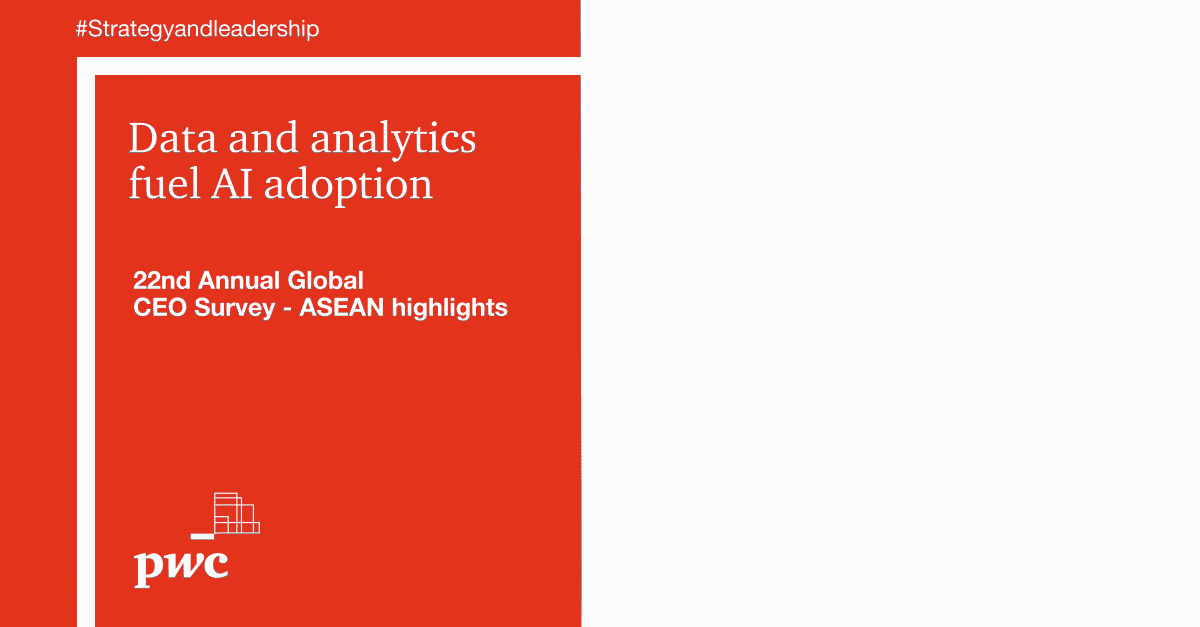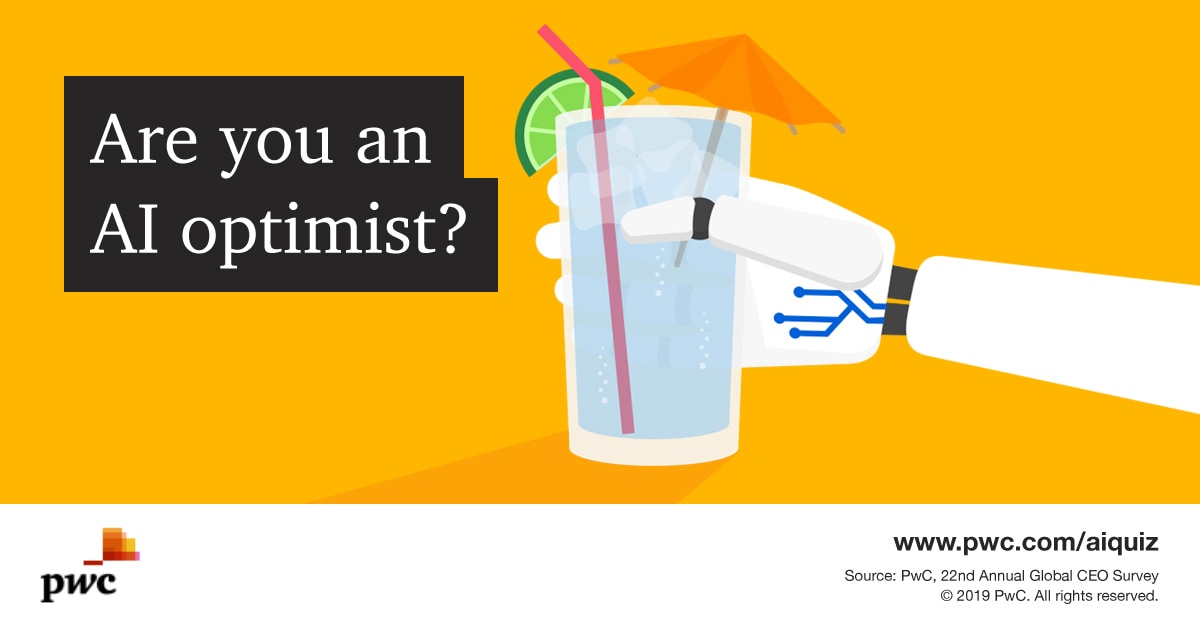ASEAN CEOs striving to ensure steady future growth
As trade conflicts and the skills and information gap continue to hurt business sentiments and shake-up confidence over this year’s growth, CEOs are striving to find ways to combat falling revenue projections. Our 22nd Annual Global CEO Survey reaffirms this drive, as much as it highlights CEOs’ consensus on the
ASEAN CEOs striving to ensure steady future growth
As trade conflicts and the skills and information gap continue to hurt business sentiments and shake-up confidence over this year’s growth, CEOs are striving to find ways to combat falling revenue projections. Our 22nd Annual Global CEO Survey reaffirms this drive, as much as it highlights CEOs’ consensus on the potential of AI and its impact over the next 5 years. Data & Analytics hold the key to AI success which in turn is critical to remaining competitive and relevant in the digital future.
Overview: Reality check
This year’s Survey reveals fading CEOs’ confidence with nearly 46% of the ASEAN CEOs expecting a decline in global GDP growth for 2019, projecting a more bearish outlook compared to their global counterparts.
The record jump in pessimism is largely driven by strong nationalist and populist sentiments sweeping the globe, even as business leaders contend with a widening information and skilled-talent gap.
Heading into 2019, businesses face challenges, creating new uncertainties and risks.
Companies in ASEAN and beyond are struggling with a surfeit of data and the lack of talent to clean, integrate and extract value from it. Most organisations haven’t moved beyond baby steps toward artificial intelligence (AI).
A more striking observation in this year’s survey - despite billions of dollars of investments and priority positioning on the CEO agenda, the gap between the information CEOs need and what they get has not closed in the past 10 years.
"The potential of AI is immense, but in order to make this next quantum leap and fulfil the promise of AI, organisations from both the public and private sectors must work hand in hand and be committed to deliver on the educational, governance, innovation and commercial considerations."
Key findings
PwC’s 22nd Global CEO Survey, based on 1,378 interviews with CEOs across 91 territories around the globe, drilled down on CEO insights in four top-of-mind areas: Growth, People, Data & Analytics, and AI. 78 ASEAN CEOs participated in the survey which explores:

What’s causing the dip in CEOs’ confidence for 2019?
Growing geopolitical fault lines
International trade tensions, political upset and uncertainty are key to the more cautious outlook on global growth for 2019. The threats that business leaders now consider most pressing are more related to the ease of doing business in the markets where they operate like over-regulation, policy uncertainty, trade conflicts and less existential such as terrorism and climate change.
More than 4 out of the 5 ASEAN CEOs were concerned over trade conflicts (83%) and geopolitical uncertainty (81%) while around 3 out of 4 saw policy uncertainty (78%), over regulation (77%) and protectionism (73%) as threat to their organisation’s growth prospects.
Information and skills gaps
This year’s survey reveals that the ‘information gap’ — the gap between the information CEOs need and what they get — has not closed in the ten years.
The CEOs believe that the lack of analytical talent, data siloing, and poor data reliability are the primary reasons behind data inadequacy, which is compounding organisations’ inability to clean, integrate and extract value from big data and accelerate the adoption of AI.
The availability of key skills emerged as the top potential business threat to organisations’ growth prospects after threats related to cyber and speed of technology change. Eighty two per cent of the CEOs in ASEAN expressed concern over talent availability.

How are CEOs navigating business risks & challenges?
Adjusting Operating Model & Growth Strategy
To accommodate trade conflicts, half the ‘extremely concerned’ business leaders are adjusting their operating model and growth strategy. While nearly a third (29%) of these ASEAN CEOs are delaying capex, 29% are adjusting supply chain and sourcing strategy, 17% are shifting growth strategy to alternate territories, 9% are delaying CAPEX and another 9% are shifting production to alternate territories.
Closing the Skills Gap
The ASEAN CEOs largely believe that significant training and up-skilling is required besides establishing a strong pipeline directly from educational institutions.
Accelerating AI adoption & unlocking value potential of Data & Analytics
Most executives believe that AI will significantly change the way they do business in the next 5 years. However, business leaders around the globe largely expect Governments to lead the future agenda on AI. A thumping majority of the ASEAN CEOs reported that AI-based decisions need to be explainable in order to be trusted and 79% of the ASEAN CEOs noted the Governments should play a critical and integral role in the development of AI.

Preparing for the oncoming AI revolution
Eighty-seven percent of the ASEAN CEOs agree that AI will significantly change the way they do business in the next five years. In fact, nearly three quarters of the ASEAN CEOs see it as bigger than the Internet.
Yet, over a third of the ASEAN CEOs have no plans to pursue AI at the moment. While 32% have plans in the next 3 years, another 28% of the ASEAN CEOs have only dipped a toe into AI for limited uses.
The jury is out on whether AI will displace more jobs than it create in the long run, with ASEAN and the Asia Pacific being the most pessimistic regions. Sixty two per cent of the ASEAN CEOs see AI displacing more jobs than it creates.
With such societal implications in mind, it’s not surprising that business leaders expect Governments to lead the future agenda on AI.
Be the Future. Align Social, Digital & Education.
The results of this year’s CEO survey may seem sobering to some, but they also provide reason for hope. The world’s senior decision makers are realistic this year about the challenges facing them, and this may incent them and their organisations to get into action mode.
As CEOs focus more on execution, search for revenue growth, work to address data and talent issues, implement emerging technologies, and seek to capture related benefits and value, we urge them to:
- Stay focused on establishing new societal frameworks needed to meet evolving human needs and foster sustainable prosperity.
- Look beyond financial performance for more effective indicators of progress. Define societal indicators that demonstrate sustainable quality of life in a more holistic and integrated way.
- Harness technology to meet the needs of people and their communities. It may hold the keys to addressing systemic challenges for the benefit of the broader community.
- Upskill current and future workforce and cultivate soft skills such as creativity, problem solving and empathy in their corporate cultures. Educational institutions need to foster lifelong development of technical skills and creative problem solving.
- Create opportunities for cooperation among governments and businesses on a global scale.
AI Optimist or Pessimist Quiz
Are you an artificial intelligence pessimist, optimist or realist? Take our CEO Survey AI quiz and compare yourself to CEOs around the world.







